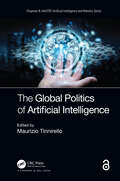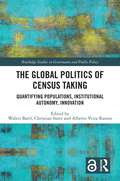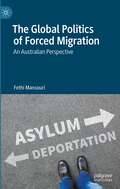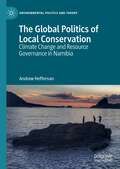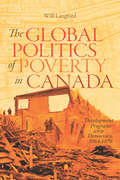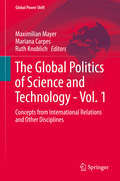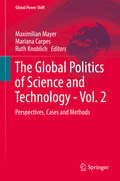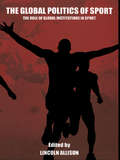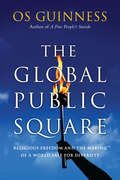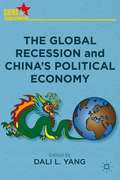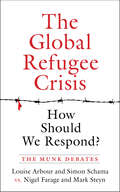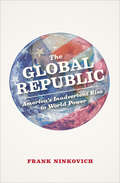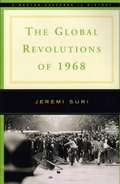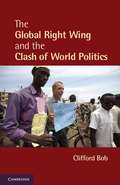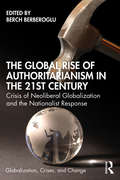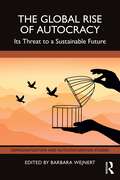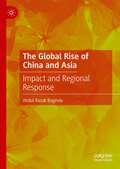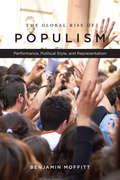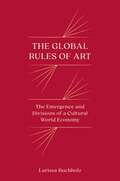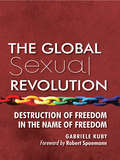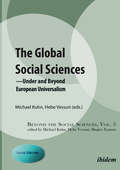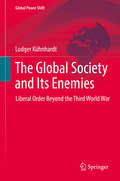- Table View
- List View
The Global Politics of Artificial Intelligence (Chapman & Hall/CRC Artificial Intelligence and Robotics Series)
by Maurizio TinnirelloTechnologies such as artificial intelligence have led to significant advances in science and medicine, but have also facilitated new forms of repression, policing and surveillance. AI policy has become without doubt a significant issue of global politics. The Global Politics of Artificial Intelligence tackles some of the issues linked to AI development and use, contributing to a better understanding of the global politics of AI. This is an area where enormous work still needs to be done, and the contributors to this volume provide significant input into this field of study, to policy makers, academics, and society at large. Each of the chapters in this volume works as freestanding contribution, and provides an accessible account of a particular issue linked to AI from a political perspective. Contributors to the volume come from many different areas of expertise, and of the world, and range from emergent to established authors.
The Global Politics of Census Taking: Quantifying Populations, Institutional Autonomy, Innovation (Routledge Studies in Governance and Public Policy)
by Christian Suter Walter Bartl Alberto Veira-RamosThis book examines in detail the state of the art on census taking to spark a more vivid debate on what some may see as a rather technical – and hence uncontroversial – field of inquiry.Against the backdrop of controversy between instrumental and performative theoretical stances towards census taking, it analyses the historical trajectories and political implications of seemingly technical decisions made during the quantification process by focusing on the 2020 round of censuses, which have been particularly revealing as activities have been affected by the ongoing COVID-19 pandemic and the ensuing containment policies. Through case studies of countries from the Global North and the Global South, the book highlights the consequences of, and innovations and challenges in census taking focusing on three particular areas of concern – the politics of the census in terms of identity politics; the institutional autonomy of the census; and significant and transformative methodological innovations.This book will be of key interest to scholars, students and practitioners of quantification studies, and social demography and more broadly to public policy, governance, comparative politics and the broader social sciences.
The Global Politics of Forced Migration: An Australian Perspective
by Fethi MansouriThis book focuses on the socio-political problems that emanate from Western states' harsh deterrence policies in their responses to refugee crises. Using Australia’s own policy as a lens, it examines the ways in which isolated and separatist reactions not only deny protection and basic human rights for asylum seekers but also do nothing to address structurally enduring push factors. Reflecting on a range of interconnected issues in migration research and asylum policy, this book draws on multidisciplinary insights and a mixed methodology to critically examine current assumptions underlying refugee policies both in Australia and internationally.
The Global Politics of Local Conservation: Climate Change and Resource Governance in Namibia (Environmental Politics and Theory)
by Andrew HeffernanThis book examines the politics of community-based natural resource management (CBNRM) in Namibia. CBNRM and similar forms of conservation across southern Africa have long been studied for their potential benefits as domestic policy tools to help improve sustainable development. However, they have often failed to achieve their stated goals. By assessing the initiation, design, implementation and outcomes of CBNRM, the book argues that communities are often unable to attain the degree of empowerment that these forms of resource governance promise. It also considers the impact of climate change on CBNRM programmes, and the responses of international actors involved in their governance. In doing so, the book demonstrates how the power imbalances that are built into the global political economy have ensured that those most marginalized in society are no better off as a result of this new form of resource governance. It will appeal to all those interested in CBNRM, conservation studies and environmental governance in Africa, as well political economy and international relations.
The Global Politics of Poverty in Canada: Development Programs and Democracy, 1964-1979 (Rethinking Canada in the World #7)
by Will LangfordIn the 1960s and 1970s, in the midst of the Cold War and an international decolonization movement, development advocates believed that poverty could be ended, at home and abroad. The Global Politics of Poverty in Canada explores the relationship between poverty, democracy, and development during this remarkable period. Will Langford analyzes three Canadian development programs that unfolded on local, regional, and international scales. He reveals the interconnections of anti-poverty activism carried out by the Company of Young Canadians among Métis in northern Alberta and francophones in Montreal, by the Cape Breton Development Corporation, and by Canadian University Service Overseas in Tanzania. In dialogue with the New Left, liberal reformers committed to development programs they believed would empower the poor to confront their own poverty and thereby foster a more meaningful democracy. However, democracy and development proved to be fundamentally contested, and development programs stopped short of amending capitalist social relations and the inequalities they engendered. The Global Politics of Poverty in Canada explores how Canadians engaged in informal and formal politics in the course of their everyday lives, locally and transnationally. Langford provides an enduring record of otherwise fleeting anti-poverty programs and their effects: the lived activism and opinions of development workers and ordinary people.
The Global Politics of Power, Justice and Death: An Introduction to International Relations
by Peter AndersonThis exciting new text adopts a challenging question-led approach to the major issues facing global society today, in order to investigate the nature and complexity of global change. Among other things it looks at the future of the state, the environment, the international political economy, war and global rivalries, and the role of international law and the UN in the post-Cold War world. The book devises a readily comprehensible "change map", which both incorporates a wide range of the fundamental concepts of international relations theory and suggests a number of new concepts capable of assisting the investigation of global change. This new framework is deployed to look closely at real world issues in order to isolate the crucial factors which determine whether or not mass hunger, for example, or enviromental abuse, can be eliminated.
The Global Politics of Science and Technology - Vol. 1
by Maximilian Mayer Mariana Carpes Ruth KnoblichAn increasing number of scholars have begun to see science and technology as relevant issues in International Relations (IR), acknowledging the impact of material elements, technical instruments, and scientific practices on international security, statehood, and global governance. This two-volume collection brings the debate about science and technology to the center of International Relations. It shows how integrating science and technology translates into novel analytical frameworks, conceptual approaches and empirical puzzles, and thereby offers a state-of-the-art review of various methodological and theoretical ways in which sciences and technologies matter for the study of international affairs and world politics. The authors not only offer a set of practical examples of research frameworks for experts and students alike, but also propose a conceptual space for interdisciplinary learning in order to improve our understanding of the global politics of science and technology. This first volume summarizes various time-tested approaches for studying the global politics of science and technology from an IR perspective. It also provides empirical, theoretical, and conceptual interventions from geography, history, innovation studies, and science and technology studies that indicate ways to enhance and rearticulate IR approaches. In addition, several interviews advance possibilities of multi-disciplinary collaboration.
The Global Politics of Science and Technology - Vol. 2
by Maximilian Mayer Mariana Carpes Ruth KnoblichAn increasing number of scholars have begun to see science and technology as relevant issues in International Relations (IR), acknowledging the impact of material elements, technical instruments, and scientific practices on international security, statehood, and global governance. This two-volume collection brings the debate about science and technology to the center of International Relations. It shows how integrating science and technology translates into novel analytical frameworks, conceptual approaches and empirical puzzles, and thereby offers a state-of-the-art review of various methodological and theoretical ways in which sciences and technologies matter for the study of international affairs and world politics. The authors not only offer a set of practical examples of research frameworks for experts and students alike, but also propose a conceptual space for interdisciplinary learning in order to improve our understanding of the global politics of science and technology.<P><P> The second volume raises a plethora of issue areas, actors, and cases under the umbrella notion techno-politics. Distinguishing between interactional and co-productive perspectives, it outlines a toolbox of analytical frameworks that transcend technological determinism and social constructivism.
The Global Politics of Sport: The Role of Global Institutions in Sport (Sport in the Global Society)
by Lincoln AllisonSport presents one of the most advanced cases of 'globalisation,' arguably because there are fewer cultural and political obstacles to the development of trade and international power in sport than there are in other fields. Thus there has been a change in the nature of the politics of sport since the end of the Cold War; the subject must be rewritten to acknowledge a twenty-first century world in which international sporting organisations and transnational corporations have become far more important than states.The Global Politics of Sport presents a range of essays examining the emerging global political issues in twenty-first century sport including: · The role, and power of organisations such as FIFA and the IOC· The influence of US exceptionalism · The construction of global sports heroes· Tensions developing within traditionally 'alternative' sports in a global commercial cultureThe Global Politics of Sport presents new and fresh exploration of different conceptions of sport as a purely commercial activity and as an activity as embodying 'higher' social and ethical values.
The Global Promise of Federalism
by Keith Banting David Cameron Grace Skogstad Martin PapillonThe Global Promise of Federalism honours the life and work of Richard Simeon, one of Canada's foremost experts on federalism. It features a group of distinguished scholars of federalism from Canada and abroad who take up some of the fundamental questions at the heart of both Simeon's work and contemporary debates. Does federalism foster democracy? Can it help bring together divided societies? How do federations evolve and adapt to changing circumstances?In the course of answering these questions, the chapters in this collection offer a comparative perspective on the challenges and opportunities facing well-established federations such as Canada and Australia, as well as new federal and quasi-federal systems in Europe, Africa, and Asia. They examine the interplay between federal values, such as trust and mutual recognition, and institutional design; the challenges facing post-conflict federations; and the adaptability of federal systems in the face of changing social, economic, and cultural contexts.
The Global Public Square: Religious Freedom and the Making of a World Safe for Diversity
by Os GuinnessLogos Bookstores' 2014 Best Book in Christianity and Culture
The Global Recession and China’s Political Economy
by Dali L. YangIn this volume, some of the leading scholars on China's development examine China's responses to the global financial crisis and their implications for China's economy, society, and the international balances of power.
The Global Refugee Crisis: The Munk Debates (The Munk Debates #2016)
by Simon Schama Mark Steyn Louise Arbour Nigel FarageThe world is facing the worst humanitarian crisis since the Second World War. Over 300,000 are dead in Syria, and one and half million are either injured or disabled. Four and a half million people are trying to flee the country. And Syria is just one of a growing number of failed or failing states in the Middle East and North Africa. How should developed nations respond to human suffering on this mass scale? Do the prosperous societies of the West, including Canada and the U.S., have a moral imperative to assist as many refugees as they reasonably and responsibly can? Or, is this a time for vigilance and restraint in the face of a wave of mass migration that risks upending the tolerance and openness of the West?The eighteenth semi-annual Munk Debate, which was held on April 1, 2016, pits former UN High Commissioner for Human Rights Louise Arbour and leading historian Simon Schama against leader of the UK Independence Party Nigel Farage and bestselling author Mark Steyn to debate the West’s response to the global refugee crisis.
The Global Republic: America's Inadvertent Rise to World Power
by Frank Ninkovich&“This remarkably well-written analysis&” of US foreign relations offers a provocative and compelling new interpretation of American Exceptionalism (Choice). For decades the United States has been the world&’s predominant superpower. The country&’s economic authority, forceful foreign policy, and leading position in international institutions are typically seen as the results of a long-standing, deliberate strategy. Furthermore, it has become widely accepted that American exceptionalism—the belief that America is a country like no other in history—has been at the root of the country&’s political and military decisions. Pioneering historian Frank Ninkovich disagrees. In The Global Republic, Ninkovich argues that the United States has been driven not by a belief in its destiny or its special character but rather by a need to survive the forces of globalization. He builds the powerful case that American foreign policy has long been entangled in questions of global engagement, while also showing that globalization itself has always been distinct from—and sometimes in direct conflict with—what we call international society.
The Global Revolutions of 1968
by Jeremi SuriThe revolutions of 1968 represent the culmination of 1960's protest movements across the globe. This casebook explores the common sources of protest and the mechanisms by which unrest became a global phenomenon. It also includes in-depth discussion of how different countries reacted to the protests. The documents reveal common experiences across national boundaries for protesters and government officials alike. In particular, the voices of protesters included here illustrate how events emerged from a constellation of ideas circulating among young people in different cultures.
The Global Right Wing and the Clash of World Politics
by Clifford BobThis book is an eye-opening account of transnational advocacy, not by environmental and rights groups, but by conservative activists. Mobilizing around diverse issues, these networks challenge progressive foes across borders and within institutions. In these globalized battles, opponents struggle as much to advance their own causes as to destroy their rivals. Deploying exclusionary strategies, negative tactics and dissuasive ideas, they aim both to make and unmake policy. In this work, Clifford Bob chronicles combat over homosexuality and gun control in the UN, the Americas, Europe and elsewhere. He investigates the 'Baptist-burqa' network of conservative believers attacking gay rights, and the global gun coalition blasting efforts to control firearms. Bob draws critical conclusions about norms, activists and institutions, and his broad findings extend beyond the culture wars. They will change how campaigners fight, scholars study policy wars, and all of us think about global politics.
The Global Rise of Authoritarianism in the 21st Century: Crisis of Neoliberal Globalization and the Nationalist Response (Globalization, Crises, and Change)
by Berch BerberogluNeoliberal globalization is in deep crisis. This crisis is manifested on a global scale and embodies a number of fundamental contradictions, a central one of which is the global rise of authoritarianism and fascism. This emergent form of authoritarianism is a right-wing reaction to the problems generated by globalization supported and funded by some of the largest and most powerful corporations in their assault against social movements on the left to prevent the emergence of socialism against global capitalism. As the crisis of neoliberal global capitalism unfolds, and as we move to the brink of another economic crisis and the threat of war, global capitalism is once again resorting to authoritarianism and fascism to maintain its power. This book addresses this vital question in comparative-historical perspective and provides a series of case studies around the world that serve as a warning against the impending rise of fascism in the 21st century.
The Global Rise of Autocracy: Its Threat to a Sustainable Future (Democratization and Autocratization Studies)
by Barbara WejnertThis book revitalizes the discourse on backsliding democracy and the global rise of autocracy, extending the consequences of their changes to a sustainable future.In three sections, the book systematically examines diverse pathways leading autocracies to rise and spread worldwide and debates the future consequences. Using a multidisciplinary approach, the book conceptualizes the rise of autocracy and the backsliding of democracy by studying dictatorship, authoritarianization processes, autocracy’s diffusion, and populism. It reveals the global spread of autocracy and reflects on the challenges this poses to, and the likely impacts on, a sustainable future.This book is of key interest to scholars and students of autocracy/autocratization, democracy and democratization, political sociology, sustainability, and more broadly to international relations and comparative politics.
The Global Rise of China and Asia: Impact and Regional Response
by Abdul Razak BagindaThis book posits an alternative narrative to China’s rise by focusing on its impact on Asia. China’s rapid rise as a multidimensional power is felt in all corners of the world and poses a direct challenge to the supremacy of the United States, which has held the status of a primary superpower ever since the end of the Cold War. For the most part, Asian countries want to avoid being dragged into this great power rivalry, preferring to adopt a more balanced and pragmatic approach. While a recognition of China’s greatness does not necessarily place states in a subservient position, the author argues that the most prudent approach for Asian nations is to avoid being caught in the middle of the US-China rivalry, as this allows them to derive benefits from both sides.
The Global Rise of Populism: Performance, Political Style, and Representation
by Benjamin MoffittOnce seen as a fringe phenomenon, populism is back. While some politicians and media outlets present it as dangerous to the U.S., Europe, and Latin America, others hail it as the fix for broken democracies. Not surprisingly, questions about populism abound. Does it really threaten democracy? Why the sudden rise in populism? And what are we talking about when we talk about "populism"? The Global Rise of Populism argues for the need to rethink this concept. While still based on the classic divide between "the people" and "the elite," populism's reliance on new media technologies, its shifting relationship to political representation, and its increasing ubiquity have seen it transform in nuanced ways that demand explaining. Benjamin Moffitt contends that populism is not one entity, but a political style that is performed, embodied, and enacted across different political and cultural contexts. This new understanding makes sense of populism in a time when media pervades political life, a sense of crisis prevails, and populism has gone truly global.
The Global Rules of Art: The Emergence and Divisions of a Cultural World Economy (Princeton Studies in Global and Comparative Sociology)
by Larissa BuchholzA trailblazing look at the historical emergence of a global field in contemporary art and the diverse ways artists become valued worldwidePrior to the 1980s, the postwar canon of “international” contemporary art was made up almost exclusively of artists from North America and Western Europe, while cultural agents from other parts of the world often found themselves on the margins. The Global Rules of Art examines how this discriminatory situation has changed in recent decades. Drawing from abundant sources—including objective indicators from more than one hundred countries, multiple institutional histories and discourses, extensive fieldwork, and interviews with artists, critics, curators, gallerists, and auction house agents—Larissa Buchholz examines the emergence of a world-spanning art field whose logics have increasingly become defined in global terms.Deftly blending comprehensive historical analyses with illuminating case studies, The Global Rules of Art breaks new ground in its exploration of valuation and how cultural hierarchies take shape in a global context. The book’s innovative global field approach will appeal to scholars in the sociology of art, cultural and economic sociology, interdisciplinary global studies, and anyone interested in the dynamics of global art and culture.
The Global Sexual Revolution: Destruction of Freedom in the Name of Freedom
by Gabriele Kuby Robert Spaemann James Patrick KirchnerThe core of the global cultural revolution is the deliberate confusion of sexual norms. It is the culmination of a metaphysical revolution as well--a shifting of the fundamental ground upon which we stand and build a culture. Instead of desire being subjected to natural, social, moral, and transcendent orders, the identity of man and woman is dissolved, and free rein given to the maximum fulfillment of polymorphous urges, with no ultimate purpose or meaning. Gabriele Kuby surveys gender ideology and LGBT demands, the devastating effects of pornography and sex-education, attacks on freedom of speech and religion, the corruption of language, and much more. From the movement's trailblazers to the post-Obergefell landscape, she documents in meticulous detail how the tentacles of a budding totalitarian regime are slowly gripping the world in an insidious stranglehold. Here on full display are the re-education techniques of the new permanent revolution, which has migrated from politics and economics to sex. Kuby's courageous work is a call to action for all well-meaning people to redouble their efforts to preserve freedom of religion, freedom of speech, and the freedom of parents to educate their children according to their own beliefs. "Mrs. Kuby is a brave warrior against ideologies that ultimately result in the destruction of man."--POPE BENEDICT XVI "As the carnage of untrammeled sexual license piles up in cultures that have embraced sexual revolutionary ideology, we need the kind of sober and thoughtful analysis Gabriele Kuby provides. Her work will help readers understand that false visions of freedom are highways to slavery, and that true freedom is to be found in self-mastery and virtue."--ROBERT P. GEORGE "Gabriele Kuby maps the topography of horror that sex unleashed from the moral order visits upon any society that allows it. She also offers a strong, much-needed dose of moral realism that offers a way out of an otherwise totalitarian result."--ROBERT R. REILLY
The Global Shelter Imaginary: Ikea Humanitarianism and Rightless Relief (Forerunners: Ideas First)
by Andrew Herscher Daniel Bertrand MonkExamines how the humanitarian order advances a message of moral triumph and care while abandoning the dispossessed Prompted by a growing number of refugees and other displaced people, intersections of design and humanitarianism are proliferating. From the IKEA Foundation&’s Better Shelter to Airbnb&’s Open Homes program, the consumer economy has engaged the global refugee crisis with seemingly new tactics that normalize an institutionally sanctioned politics of evasion. Exploring &“the global shelter imaginary,&” this book charts the ways shelter functions as a form of rightless relief that expels recognition of the rights of the displaced and advances political paradoxes of displacement itself.
The Global Social Sciences: Under and Beyond European Universalism (Beyond the Social Sciences #3)
by Michael Kuhn Hebe Eds. VessuriThe European social sciences tend to absorb criticism of their approach and re-label it as a part of what the critique opposes; thus criticism of European social sciences by subaltern social sciences, their 'talking back,' has become a frequent line of reflection. The relabeling of the critique of the European approach as a critique from 'Southern' social sciences of 'Western' social sciences has in effect turned 'Southern' as well as 'Western' social sciences into competing contributors to the same 'globalizing' social sciences. Both are no longer arguing about the European approach to social sciences but about which social thought from which part of the globe should prevail. If the critique becomes a part of what it opposes, one might conclude that the European social sciences are adaptable and capable of learning. One might, however, also raise the question whether there is anything wrong with the criticism of the European social sciences, or, for that matter, whether there is anything wrong with the European social sciences themselves. The contributions in this book discuss these questions from different angles: They revisit the mainstream critique of the European social sciences, and they suggest new arguments criticizing social science theories that may be found as often in the 'Western' as in the 'Southern' discourse.
The Global Society and Its Enemies: Liberal Order Beyond the Third World War (Global Power Shift)
by Ludger KühnhardtThis book discusses contemporary constellations of international politics and global transformation. It offers guidance on how to conceptualize the complexity of current global changes and practical policy advice in order to promote an open global society. In the light of today’s challenges, the author re-interprets the main argument of the philosopher Karl Popper in "The Open Society and Its Enemies". Based on this framework and new empirical evidence, the book discusses the thesis of an ongoing Third World War, triggered by fundamental deficits in nation-building, occurring primarily within states and not between them, and accelerated by asymmetric forms of warfare and Islamist totalitarianism.The book also explores various threats to the global order, such as the paradox of borders as barriers and bridges, the global effects of the youth bubble in many developing countries, and the misuse of religious interpretation for the use of political violence. Lastly, the author identifies advocates and supporters of a liberal, multilateral and open order and argues for a reinvention of the Western world to contribute to a revival of a liberal global order, based on mutual respect and joint leadership.
